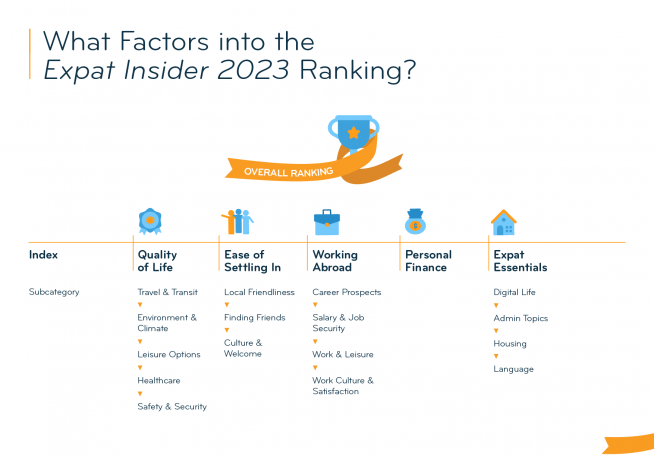Expat City Ranking Methodology
The online questionnaire was promoted through the InterNations community, the company’s newsletter, and its social media profiles, but responses were not limited to InterNations members. The target audience included all kinds of expats, from foreign assignees — i.e., employees sent on a corporate assignment abroad — and international hires to self-made expats relocating for a better quality of life and a variety of other reasons.
A total of 12,065 expats participated in the survey, representing 171 nationalities and living in 172 countries or territories worldwide. The results are published in the form of an overall Expat City Ranking, as well as additional information on five topical indices: Quality of Life, Ease of Settling In, Working Abroad, Personal Finance, and Expat Essentials.
A city needed a sample size of at least 50 survey respondents to be listed in any of the indices and the overall ranking. In 2023, 49 cities met this requirement.
For the rankings themselves, survey participants were asked to rate up to 56 different factors related to various aspects of expat life on a scale of one to seven. The rating process emphasizes the respondents’ personal satisfaction with these factors and considers both emotional topics (e.g., making local friends) and more factual aspects (e.g., housing costs) with equal weight.
The respondents’ ratings of the individual factors were bundled in various combinations for a total of 16 subcategories, and their mean values were used to draw up the five topical indices mentioned above. These five indices, as well as the responses to the question “All things considered, how happy are you with your life abroad in general?”, were then averaged to arrive at the overall Expat City Ranking.
It is important to note that the ratings are a comparison of how satisfied survey respondents are with various aspects of life in their respective destination. They are not an objective comparison of verified facts from external sources. For example, the factor “personal safety” measures how safe expats feel in their respective destination, but it does not refer to actual crime rates provided by that country’s law enforcement authorities.
The resulting ranking is not meant to be an endorsement of any specific destination. It is rather a comparison of how expats rate their everyday life abroad, and the indices do not cover each and every potential aspect of living abroad. For instance, the questionnaire asked respondents to give their views on selected factors such as political stability, unrestricted online access, and the general ability to freely express themselves and their opinions. But the vast field of political issues — e.g., questions of censorship or human rights — is not explored in any depth in this survey.
All percentages have been rounded to full integral numbers. In some cases, this may lead to responses to one question adding up to either 99% or 101%, instead of 100%. These instances are simply due to rounding and are not based on erroneous data.
Further Reading
- The Best (& Worst) Cities for Expats in 2023
- Your Map to Settling In: Where It’s Easy & Where It’s Not
- These Cities Offer the Highest Quality of Life
- Best & Worst Cities for Working Abroad in 2023
- The Cities That Make It Easy to Get Started
- The Best (& Worst) Cities for the Cost-Conscious Expat
- Countries Where Expats Love (& Hate) Living in 2023




